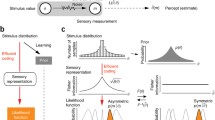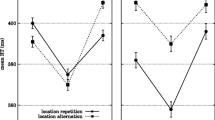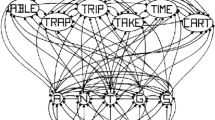Summary
An experiment was designed to distinguish between two explanations of the word frequency effect, each accounting for the effect in terms of response bias. One explanation assumes that the bias affects a viewer's percept, the other a decision about what to report. Subjects were shown common and uncommon words, degraded to various degrees. Their task was to state what word was presented and to estimate its degree of degradation. A word frequency effect was demonstrated: the degree of actual degradation at which some arbitrary proportion of common words was correctly reported was greater than that at which the same proportion of uncommon words was correctly reported. In addition, subjects correctly assessed that the common words correctly reported were more degraded. The result was discussed with reference to the two versions of response bias theory.
Similar content being viewed by others
References
Adams MJ (1979) Models of word recognition. Cognit Psychol 11:133–176
Broadbent DE (1967) The word frequency effect and response bias. Psychol Rev 74:1–15
Broadbent DE (1971) Decision and stress. Academic Press, London
Broadbent DE, Broadbent MPH (1975) Some further data concerning the word frequency effect. J Exp Psychol Gen 104:297–308
Howes DH, Solomon RL (1951) Visual duration threshold as a function of word probability. J Exp Psychol 41:401–410
Kahneman D (1973) Attention and effort. Prentice-Hall, Englewood Cliffs, NJ, pp 91–97
Morton J (1969) The interaction of information in word recognition. Psychol Rev 76:165–178
Morton J (1970) A functional model for memory. In: Norman DA (ed) Models for human memory. Academic Press, New York, p 213
Pillsbury WB (1897) A study in apperception. Am J Psychol 8:315–593
Thorndike EL, Lorge I (1944) The teacher's wordbook of 30,000 words. Columbia University, Teachers' College, Bureau of Publications, New York
Author information
Authors and Affiliations
Additional information
The discussion in this paper was materially assisted by comments made by Donald Broadbent, whose help is gratefully acknowledged.
Rights and permissions
About this article
Cite this article
Wilton, R., Pidcock, B. Recognition of the stimulus degradation in the word frequency effect. Psychol. Res 44, 67–74 (1982). https://doi.org/10.1007/BF00308556
Received:
Issue Date:
DOI: https://doi.org/10.1007/BF00308556




